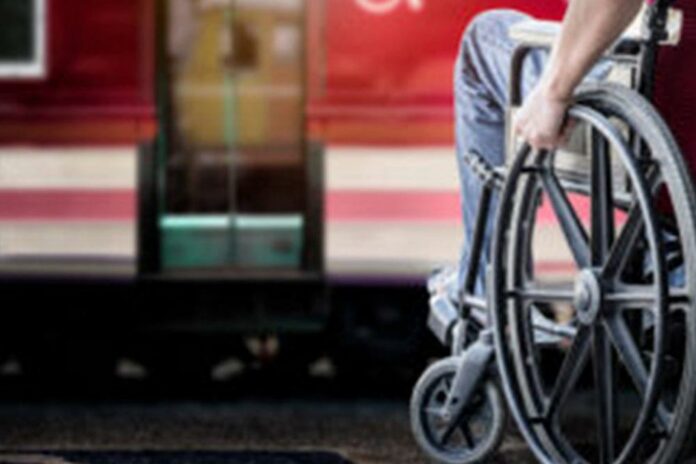- Despite lockdowns and low transport use, disability hate crime on rail networks remains a worrying issue, with 16% of disability hate crime reports to British Transport Police in 2020/21 including violence
- None of the reports were referred to the Crown Prosecution Service
- As public transport use continues to rise, charities Leonard Cheshire and United Response call on public to take a stand against disability hate crime and urge for more training for transport staff
As commuting levels begin to surge again, disability charities call for better measures to deter disability hate crime on the country’s rail networks.
New research from charities Leonard Cheshire and United Response has revealed that disability hate crimes are on the rise again across England and Wales, with around 25 crimes reported to police every day in 2020/21.
And despite lockdown and restrictions on travel last year, disabled people still experienced incidents of hate crime across the rail networks. An FOI of the British Transport Police found that there were 31 reports of disability hate crime in 2020/21, 16% of which included an element of violence.
This is line with trends the charities discovered from 39 police forces across England and Wales, with almost half of the disability hate crimes reported to police last year classed as ‘violent’ (44%). These include assault and crimes involving weapons.
Emma from Birmingham recalled the disability hate crime she experienced on a London bus: “When trying to board a bus once in my time as a student on the outskirts of London, a mother with a pram refused to fold her pram or move in any way to allow me access to the wheelchair space. She then verbally abused both the driver and I, swearing and using ableist slurs aimed at me.
“I was verbally abused for simply wanting to board the bus as a wheelchair user. Verbally abused for simply wanting to go shopping. I think the most misunderstood thing about disability hate crime is the lasting impact it leaves. I still remember every detail of the incident I was victim in, years later.”
Worryingly, none of the reports to the British Transport Police in 2020/21 were referred to the Crown Prosecution Service. While only 1% of cases reported to police were referred to the Crown Prosecution Service or received a charge.
Director of Policy at Leonard Cheshire Gemma Hope said: “Disabled people have a right to feel safe in society and confident in reporting hate crimes. Yet many disabled people we have spoken to said they wouldn’t report the hate crime they experienced. There needs to be better access to disability specific support for victims of these crimes, and reporting processes need to be made easier too.
“We echo the recent sentiments from The National Union of Rail, Maritime and Transport Workers around investment in staff training and applaud the steps taken by the Office of Rail and Road recently to specifically train staff in offering assistance to disabled passengers. But this training needs to extend to disability hate crime awareness, with specialist disability liaison officer deployed across our rail networks to offer support. Otherwise, this is yet another barrier disabled people face when travelling, with our latest rail audit revealing 41% of stations lack step-free access.
“As many of us return to public transport on a regular basis, we must work together to ensure rail does not become a no-go area for disabled passengers.”
Having conducted in-depth consultation with disabled people who have experienced hate crime, the charities are keen to see disability specific support provided by police or charities to help people move forward after experiencing hate crime.
Most disabled people told the charities that one of the most important steps in tackling hate crime is creating a more accepting society where differences are tolerated. The Government’s National Disability Strategy pledged to raise awareness of disability and the charities want to see how this will be implemented with young people in schools.
United Response and Leonard Cheshire are now asking everyone to show they stand against disability hate crime, by sharing their latest findings with the hashtag #NoPlaceForHate and pledging to make their own online presence a safe space for all.
Leonard Cheshire is also calling on people to sign up to their disability hate crime campaign at: leonardcheshire.org/hatecrime
Photo credit: ORR



































 0113 2082620
0113 2082620 info@railbusinessdaily.com
info@railbusinessdaily.com 15 Mariner Court, Wakefield WF4 3FL
15 Mariner Court, Wakefield WF4 3FL

